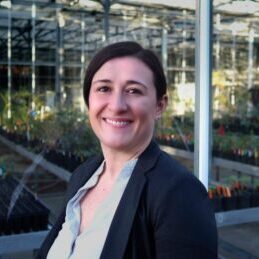Ross Sozzani

STEPS Co-deputy Director
Director for the Plant Improvement Platform, PSI
NSF AccelNet Lead
ross_sozzani@ncsu.edu WebsiteBio
Rosangela (Ross) Sozzani, is a Professor in the Synthetic and Systems Biology Chancellor’s Faculty Excellence Program in the Department of Plant and Microbial Biology at North Carolina State University. Prior to serving as a STEPS co-Deputy Director, she became and retains the role of Director for the Plant Improvement Platform for the NC Plant Science Initiative (NC PSI). In this leadership role, the long-term vision that pushes her is her desire to help nourish the growing population without further harming the environment. Her Plant Improvement Platform is focused on a defined list of strategic goals and objectives, as well as initiatives to meet specific near-term and long-term needs. Specific but flexible research on crop protection from biotic and abiotic stresses and the fundamental role of microorganisms in sustaining soil and plants, that will allow her to collaboratively align the NC PSI Plant Improvement Platform with the STEPS vision of 25-in-25 in a high-quality, meaningful way. Through her role in the NC PSI, she is a co-investigator on two projects with the Game-Changing Research Incentive Program for Plant Sciences Initiative (GRIP4PSI) and the lead of an NSF AccelNet project aimed at accelerating integration of engineering, life science, and agricultural research to prepare the next generation of U.S. researchers for multiteam international collaborations.
Sozzani earned a B.S. and a M.S in Biological Sciences from the University of Pavia, Italy. She holds a PhD in Genetic and Biomolecular Sciences from the same atheneum. After completing her post-doctoral studies in Systems Biology at Duke University, Sozzani returned to the Department of Biology and Biotechnology at the University of Pavia, Italy, as an Assistant Professor. Her work was supported by the Armenise-Harvard Carrier Developmental Award, which is presented to outstanding, early-career scientists with special skills, enabling them to make significant contributions to their fields of research in Italy. There, her international collaborations with mathematicians, physicists and computational biologists led to new ways of integrating imaging tools with genome-wide approaches, along with the modeling of regulatory networks to monitor the function of biological circuits over time at a cellular resolution. Sozzani was hired at NC State in 2013 as a member of the Synthetic and Systems Biology Chancellor’s Faculty Excellence Program, a team of molecular biologists, chemists and engineers who work to understand and modify living organisms to help eradicate disease and meet increasing worldwide demands for sustainable food and energy.
Her research focuses on the molecular mechanisms that regulate growth and development of multicellular organisms. Her interest is to use large biological data and develop algorithms or models to understand biological systems and relationships at multi-scale level and translate this knowledge to engineering plants with enhanced agronomic function. She received a National Science Foundation CAREER award. She intentionally involves her group members in interdisciplinary projects at NC State and outside the University and pushes for convergence strategies and diversity and inclusion in research. By doing so, she also equips students for the workforce. These students understand the societal and economic impact of the research that we undertake in STEPS.Sozzani is an extremely communicative person, in fact so communicative that, as Italian, she likes using her hands when speaking. She communicates her ideas, goals, and efforts to others within and beyond her systems biology discipline effectively, she constantly works with others not only to learn new techniques and science, but to share her knowledge and thinking out of the box as well. She unhesitatingly offers advice and support to early career researchers. As such she is highly regarded as a collaborative team player and leader. Those characteristics will ensure epistemic humility, interdependence and co-creation of knowledge, which are the human convergence toolkit for the STEPS 25-in-25 vision.
